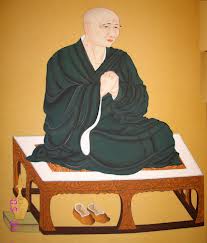Difference between revisions of "Pu-k'ung"
(Created page with "thumb|250px| <poem> Pu-k'ung [不空] (705–774) (PY Bukong; Skt Amoghavajra; Jpn Fuku) Amoghavajra An Indian monk who went to China to d...") |
|||
| Line 4: | Line 4: | ||
[不空] (705–774) (PY Bukong; Skt Amoghavajra; Jpn Fuku) | [不空] (705–774) (PY Bukong; Skt Amoghavajra; Jpn Fuku) | ||
Amoghavajra | Amoghavajra | ||
| − | + | ||
| + | An Indian [[monk]] who went to China to disseminate [[Esoteric Buddhism]]. Pu-k'ung is his Chinese name. Born in northern India (Central Asia or Sri Lanka according to some accounts), in 720 he journeyed to Lo-yang in China and became a disciple of Chin-kang-chih (Skt Vajrabodhi).In 741, after Chin-kang-chih's death, he went to India and Sri Lanka in search of esoteric scriptures.In 746 he returned to China, where he won the patronage of Emperor Hsüan-tsung and his successors, and conducted esoteric rituals for the protection of the nation.Pu-k'ung propagated Esoteric Buddhism and also translated many esoteric scriptures, including the Diamond Crown Sutra, into Chinese.He is regarded as the sixth patriarch in the lineage of Esoteric Buddhism by the True Word ( Jpn Shingon) school.Among his six major disciples was Hui-kuo, who transferred [[Esoteric Buddhism]] to Kobo, the founder of the True Word school. | ||
</poem> | </poem> | ||
{{R}} | {{R}} | ||
Revision as of 09:19, 15 May 2013
Pu-k'ung
[不空] (705–774) (PY Bukong; Skt Amoghavajra; Jpn Fuku)
Amoghavajra
An Indian monk who went to China to disseminate Esoteric Buddhism. Pu-k'ung is his Chinese name. Born in northern India (Central Asia or Sri Lanka according to some accounts), in 720 he journeyed to Lo-yang in China and became a disciple of Chin-kang-chih (Skt Vajrabodhi).In 741, after Chin-kang-chih's death, he went to India and Sri Lanka in search of esoteric scriptures.In 746 he returned to China, where he won the patronage of Emperor Hsüan-tsung and his successors, and conducted esoteric rituals for the protection of the nation.Pu-k'ung propagated Esoteric Buddhism and also translated many esoteric scriptures, including the Diamond Crown Sutra, into Chinese.He is regarded as the sixth patriarch in the lineage of Esoteric Buddhism by the True Word ( Jpn Shingon) school.Among his six major disciples was Hui-kuo, who transferred Esoteric Buddhism to Kobo, the founder of the True Word school.
